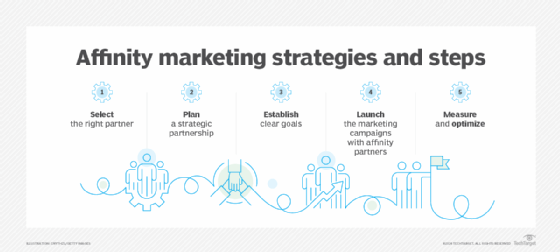affinity marketing
What is affinity marketing?
Affinity marketing is a type of direct marketing in which a business forms a partnership with an organization to provide goods or services in exchange for access to a new market.
In this type of campaign, two parties -- the affinity group, made up of people linked by a common interest or goal, and the business providing the group with a product or service -- link their brands in a mutually beneficial way.
Why is affinity marketing important?
Affinity marketing represents a powerful strategy for businesses looking to expand their reach and enhance customer loyalty through strategic partnerships. By leveraging the built-in trust and focus of affinity groups, companies can effectively introduce their products and services to new markets in a manner that feels personalized and genuine.
With careful planning and execution, affinity marketing can yield substantial benefits for all involved parties, fostering long-term business growth and customer satisfaction.
Key components of affinity marketing
An affinity marketing campaign includes the following components:
The affinity group
The affinity group in an affinity marketing campaign consists of individuals who share a specific interest or purpose. These groups serve as the bridge between the business and a new set of potential customers who are part of the group due to their common interests.
Examples of affinity groups include professional associations, alumni organizations, nonprofit organizations, social clubs and advocacy groups.
Business partners
Businesses that engage in affinity marketing vary widely in nature and size, encompassing sectors like retail, finance, insurance, and hospitality. These businesses seek to tap into the established trust and community of the affinity group to broaden their market reach and enhance brand loyalty.
Advantages of affinity marketing
With affinity marketing, the business providing the product or service gains new customers by capturing a larger audience. The opposite of competitive marketing, affinity marketing aims to boost brand loyalty and market awareness of products and services for all involved parties.
Access to targeted markets
Affinity marketing allows businesses to access well-defined and engaged markets. The preestablished trust within affinity groups facilitates easier and more effective marketing, as the group's endorsement serves as a powerful influence on consumer decisions.
Enhanced brand loyalty
By associating with groups that members passionately support, businesses can enhance brand loyalty. This strategy not only introduces new customers to the business but also strengthens brand recognition and loyalty among existing customers.
Mutual benefits
Both the business and the affinity group benefit mutually from this marketing strategy. While the business accesses a new customer base, the affinity group can offer additional value to its members, often in the form of exclusive deals or products tailored to their interests.

Strategic considerations in affinity marketing
Here are a few of the considerations businesses should make when planning an affinity marketing strategy.
Choosing the right partner
The success of an affinity marketing campaign heavily depends on selecting the right partner. The ideal partner should have a complementary, noncompetitive offering and share a similar target audience. This alignment ensures that the partnership is strategically beneficial to both parties.
Businesses that team up with affinity groups might vary in size and focus. Affinity groups include unions, sports teams, nonprofits and charities, and companies that focus on specific demographics. The groups typically have a strong connection with a large number of consumers who can potentially be targeted more easily than by way of a traditional marketing process.
For example, in a partnership between a grocery store and a bank, shoppers might receive offers to open a credit card in the store. The bank's goal could be to increase its market share and improve its branding while the store might be looking to boost customer loyalty by offering a reward program with a new credit card. Hotels and airlines often forge similar partnerships with financial institutions.
Campaign development and execution
Effective affinity marketing campaigns require meticulous planning and execution. This involves collaboration between marketing strategists and negotiators to craft a campaign that appeals to the affinity group while also meeting the business objectives.
Contractual agreements
Clear terms and responsibilities must be established to align the goals of both partners. This includes outlining the scope of the campaign, roles in execution, financial arrangements and metrics for success. Such clarity helps prevent misunderstandings and ensures that both parties remain committed to the shared goals.
Challenges and considerations of affinity marketing
Affinity marketing isn't without its challenges. Participants should keep the following in mind:
Managing expectations
Both parties must manage expectations and ensure that the offerings meet the needs of the group members without compromising the brand's integrity or value proposition.
Risk of brand dilution
There is a potential risk of brand dilution if the affinity group's values or actions conflict with those of the business. Therefore, businesses must thoroughly vet potential partners to ensure alignment in values and public perception.
Compliance and legal issues
Affinity marketing must adhere to legal standards, particularly in disclosures and marketing practices. Compliance is crucial to maintain transparency and avoid potential legal pitfalls associated with privacy, data security and consumer protection laws.
Modern marketers must embrace artificial intelligence, voice search, chatbots, personalized marketing, video, social commerce, influencers, virtual reality, sustainability and big data for a competitive edge. Learn about 10 trends to watch out for in today's marketing environment.
